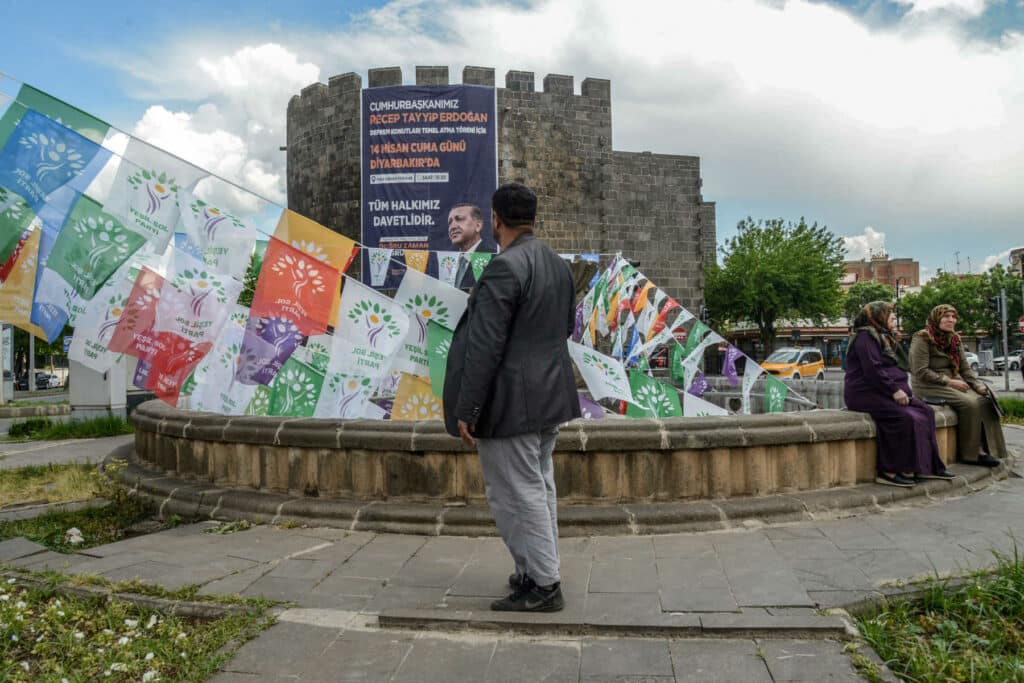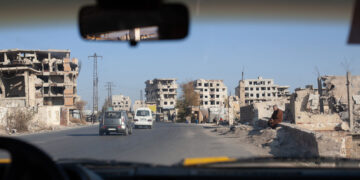Jessie Williams is a freelance multimedia journalist and writer based in London. Her work has been published in TIME, The Guardian, The Sunday Times, Foreign Policy, BBC News, The Economist, and the Financial Times, among others.
Arman strummed on his guitar and began singing a traditional Kurdish folk song as the sun set over Mardin, an ancient city in Turkey's Kurdish region in the southeast of the country. The 34-year-old artist from Cizre, a town on the Tigris River along the Syrian border, is a passionate advocate of Kurdish rights and culture, like his father and grandfather before him.
It was late May, the day before Turkey's election run-off, and as we sat on Arman's terrace, joined by a handful of his Kurdish friends who took turns to play the guitar and sing, the talk was of politics. (Arman's name, like other Kurds I interviewed for this story, has been changed to protect his identity.)
The election was touted as a landmark vote—the most important in the history of modern Turkey, according to many—with President Recep Tayyip Erdogan said to face the biggest threat to his two-decade rule from an opposition united behind Kemal Kilicdaroglu, the long-time head of the Republican People's Party, Turkey's oldest political party. In the end, though, Erdogan emerged victorious, winning a third term and further consolidating his power. The run-off was marred by an anti-refugee backlash—led not by Erdogan but by Kilicdaroglu, who thought he could win over the far right and ultranationalists with promises to kick out the nearly 4 million refugees in the country, most of them Syrian.
"Nationalism is turning into a more effective ideology in politics. Of course, this is dangerous."
- Reha Ruhavioğlu
Before the election, Arman had hoped that change was possible. He was going to vote for Kilicdaroglu, who was backed by a broad coalition that included the People's Democratic Party (HDP), a pro-Kurdish party. "I believed in the first round the opposition was supposed to win, and in the second round they should win, but the government will create voting fraud," he told me, between drags on a Gauloise. Erdogan's ruling Justice and Development Party, the AKP, "has been in power more than 20 years, so they have everything under their control," he said with resignation.
Kurds are the largest ethnic minority in Turkey and have faced constant repression since the early days of the Turkish Republic in the aftermath of World War I, with restrictions imposed by the government on expressions of Kurdish culture, identity and political representation. There are fears among the Kurdish community in Mardin that things could get even worse with the surge in Turkish ultranationalism following the recent election, and as politicians try to gather support ahead of local elections next year.
The national elections in May saw a rise in the vote share of hard-line nationalist parties, and parliament is now the most nationalist and conservative in the history of modern Turkey, including more MPs from ultranationalist and radical Islamist parties. Experts have warned of what this means for Turkey's Kurds—from the criminalization of Kurdish politics to the censorship of Kurdish media.
"Nationalism is turning into a more effective ideology in politics. Of course, this is dangerous," said Reha Ruhavioğlu, director of the Diyarbakir-based Kurdish Studies Center, in an interview with Democracy in Exile. "I think it is more likely that Erdogan will put pressure on Kurdish political representatives and Kurdish art and media, instead of the daily life of Kurds."

Daily life for Kurds in areas outside Turkey's Kurdish region is already difficult. Arman previously worked as a chef in Antalya, on Turkey's southwestern coast, where he said he was often harassed by nationalist, far-right groups. "That was 10 years ago," he said. "Now the situation is very horrible for us." He is always singled out as Kurdish in public, whether while shopping or at work—"'Oh he's a Kurd,' this kind of discrimination," he said. "That's why I stopped working as a chef."
Many Kurds like Arman feel they are used as political pawns. "Before Erdogan came to power, he promised Kurds a lot of things in order to get Kurdish votes," Arman recalled. "He promised that he would make the Kurdish language legal, visually and educationally. But in the educational system, there is no elementary school education in Kurdish, so children cannot study their own mother tongue in their schools."
Arman fears that Turkification—the term given to policies that emphasize the homogeneity of Turkey's culture, language and population—will continue after Erdogan, whose third team runs until 2028. "All marginalized and vulnerable groups need to have equal rights, otherwise we do not live in a democracy," he said. That includes Kurds, refugees, Roma people, the LGBTQ community, Arabs and women. "We do have open-minded Turks who are supportive—we have a little bit of hope—but it's not satisfied hope, because there are Turks that might accept you as a Kurd, but they won't accept that you want freedom, your own land, and to be separate from Turkey," he added.
Ever since 2015, when the Turkish government's fragile peace process collapsed with the Kurdistan Workers' Party (PKK), a militant Kurdish separatist group that is designated a terrorist entity by Turkey, the United States and the European Union, Erdogan has clamped down on Kurds. The crackdown worsened in the lead-up to the elections this spring, with Erdogan attempting to ban the HDP over its alleged ties to the PKK, which the HDP deny. In mass arrests in April, more than 100 people were rounded up over alleged Kurdish militant ties, including politicians, lawyers and journalists. They joined many members of the pro-Kurdish political movement who have been in jail for years. Among Kurdish politicians who have been arrested in recent years were mayors across southeastern Turkey who were removed from their posts by the government, in the name of "counterterrorism," and replaced by Ankara-appointed governor "trustees" without holding new elections.
Kurds were seen as crucial to boosting Kilicdaroglu's attempt to unseat Erdogan. But the opposition candidate's embrace of the leader of the far-right and ultranationalist Victory Party in the run-off cost him the support of some Kurds. Despite that, most Kurdish people I spoke to said they still voted for Kilicdaroglu, including a 29-year-old Kurdish filmmaker, Lawin, who I accompanied as he voted in his hometown of Mardin.
There are fears among the Kurdish community that things could get even worse with the surge in Turkish ultranationalism following the election.
- Jessie Williams
The grey clouds above us threatened to unleash rain as we walked up the steps to the school that had been turned into a polling station on May 28. "Kilicdaroglu might not do all the promises that he tells Kurds he will do, but at least there will be more changes," Lawin told me. His mood had been forlorn earlier in the day, but after he voted he seemed happier, even though he knew Erdogan would still likely win. "Even one vote is hope," he said.
But did he have any hope for the future? "Not as a Kurd, or other ethnic minorities in Turkey," Lawin said. "Even as a Turk, we cannot take the situation here anymore. There is no freedom of speech." He said that most people in Turkey want to move to Europe— which is just what he is planning to do.
When Erdogan was declared the winner, the disappointment was palpable in Mardin. "I am so sad," said Viyan, 32, a charity worker who had just returned from voting in her hometown of Diyarbakir, the de-facto capital of the Kurdish region. "It will be so much worse for us now in Turkey."
Despite their anguish, there are still pockets of hope in the Kurdish community. On my last night in Mardin, some friends taught me Delilo, a popular traditional Kurdish folk dance. We lined up in an empty bar, linking our fingers together and stepping in unison to the beat of the music. The dance is performed at weddings and family gatherings. It is considered by some as a small act of resistance against the suppression of Kurdish culture in Turkey.
Arman said that in the early 2000s people started worrying about Kurdish culture fading away. But since then, there has been a boom, despite the political repression. "Suddenly we saw culturally, economically and socially, new music, and more interest in learning the Kurdish language," he said, while strumming his guitar. "There are still people writing, making music, and dancing; we are keeping the Kurdish culture alive."





































